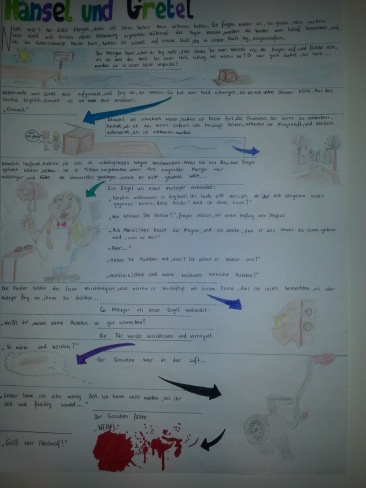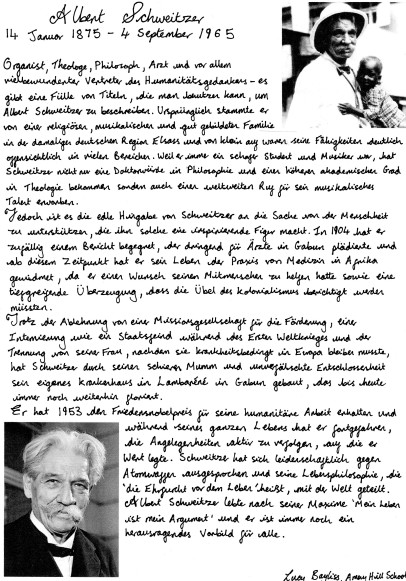The Oxford German Olympiad 2017 is officially closed and yesterday evening the winners were invited to attend a prize ceremony in Oxford. We’re delighted to announce all the winners here. And while you’re here, why not take a look at some of their work as well?
Peoples have always migrated and taken their languages and stories with them. Moreover, languages and cultures are almost never confined to one geographical area or one nation. This year, the Oxford German Olympiad explored German peoples, language and culture beyond the borders of Germany. We asked students across the UK to think about where German is spoken throughout the world in all its variants and how it got to all those places, as well as modern German-speaking migrants and the texts and opinions they take with them.
Oxford German Olympiad 2017 — The Winners
Years 5 and 6 (age 9-11)
Draw a comic strip:
Winner: Seren Billington
Runner-up: Charity Clifford
Runner-up: Rianne Thomas
Highly Commended: Nile Studt
Highly Commended: Helen Li
This slideshow requires JavaScript.
Design a menu:
Winner: Sydney Smith & Ellie Grimsey
Runner-up: Helen Li
Highly commended: Hester Perry
Commended: Anastasia Ellis, Olivia Hough, Liberty Caraher
This slideshow requires JavaScript.
Illustrate your favourite German word:
Winner: Sophie Moss
Runner-up: Dinara Gill
Highly commended: Lydia Morgan
Highly commended: Aisha Akhtar
Commended: Joshua Mariott
Commended: Martha Block
This slideshow requires JavaScript.
Years 7 to 9 (age 11-14):
Write a conversation between a Deutscher Schäferhund and a Bernhardiner
Winner: Aishwarya Shanmuganathan
Runner-up: Izzie Grout
Highly Commended: David Demetriou & Alfie Stocker
Commended: Emma Haythornthwaite
Commended: Charlotte Preston
Commended: Fifi Dunphy
Commended: Elizabeth Gliznutsa
This slideshow requires JavaScript.
When Hitler Stole Pink Rabbit: Summarise or write about the adventures of Anna’s toy dog
Winner: Eleanor Voak (Pink Rabbit Winner)
Runner-up: Khadijah Rahman
Runner-up: Layla Barwell
Highly Commended: Helena Taylor
Commended: Xiaoli Biggs
Commended: Lara Koch & Elizabeth Appleford (Pink Rabbit Commended)
This slideshow requires JavaScript.
Design a brochure
Winner: Alina Gantner & Maria Maratovna Nazhmeddinova
Winner Dario Brincat
Runners-Up: Mahliha Taylor & Rosa Boyd
Highly Commended: Pamela Shahbakhti
Commended: Ngum Mofor
Commended: Abesha Balakumar & Ikra Kabir
This slideshow requires JavaScript.
Years 10 and 11 (age 14-16):
Relocate the adventures of Hänsel und Gretel and write their story
 Winner: Simrit Sekhon
Winner: Simrit Sekhon
Runner-up: Loretta Bushell (Runner up Hansel and Gretel)
Runner-up: Sofia Justham Bello (Runner up 2 Hansel and Gretel)
Commended: George Phibbs (Commended Hansel and Gretel)
Commended: Sebastian Roberts (Commended 2 Hansel and Gretel)
Write a blog post or short article
Winner: Olivia Shelton (Winner Blog Post)
Runner-up: Isobel Horsfall (Runner up Blog Post)
Highly Commended: Jacob Melia, Daniel Mills, Alex Rowley (Highly Commended Blog Post)
Highly Commended: Alasdair Czaplewski (Highly Commended 2 Blog Post)
Commended: Pyotr Baskakov (Commended Blog Post)
Write a profile
 Winner: Lucy Bayliss
Winner: Lucy Bayliss
Runner-up: Ekaterina Rahr-Bohr (Runner up Profile)
Highly Commended: Iris Bertrand (Highly Commended Profile)
Highly Commended: Jessica Ebner-Statt (Highly Commended 2 Profile)
Commended: Yao-Chih Kuo (Commended Profile)
Commended: Sophie Noble (Commended 2 Profile)
Years 12 and 13 (age 16-18):
Migrating Communities
Winner: Simone Jackson (Winner Migrating Communities)
Runner-up: Beth Molyneux (Runner up Migrating Communities)
Highly Commended: Isabel Yurdakul (Highly Commended Migrating Communities)
Highly Commended: George Ruskin (Highly Commended 2 Migrating Communities)
Commended: Lidija Beric (Commended Migrating Communities)
Commended: Amy Lewis Commended 2 Migrating Communities)
Dialect Essay
Winner: Mariella Clarke (Winner Dialect Essay)
Runner-up: Franziska Alting (Runner up Dialect Essay)
Highly Commended: Maia Jarvis (Highly Commended Dialect Essay)
Highly Commended: Emma McDowell (Highly Commended 2 Dialect Essay
Colonial History Essay
Winner: Helena de Guise (Winner Colonial History)
Winner: Beth Molyneux (Winner 2 Colonial History)
Runner up: Lilian Tosner (Highly Commended Colonial History)
Runner up: Eden Magid (Runner Up 2 Colonial History)
Highly Commended: Hugo Gallagher-Boyden (Highly Commended Colonial History)
Highly Commended: Phuong Bui (Highly Commended Colonial History)
Special Prize for pupils outside the UK: Maurice Zoa & Bruno Ndougou
Open Competition for Groups or Classes (4+ participants)
Write and perform a rap about the German language
Winner: Samantha Martin, Veronica Kravchenko, Laura Newey, Faye Metcalfe
Runner-up: Pierre Meyer, Nicholas Poat, Travis Richards, Thomas Barnes (Deutsch Rap – Transcript)
Highly Commended: Jodie Gollop, George Bayliss, Nicholas Speed, William Coupe
Create a web page or website on the theme ‘Deutsche jenseits von Deutschland’
Winner: Propa Anwar, Lidija Beric, Rayya Shareef, Precious Quaye
Runner-up: Miles Begley, Rupert Hill, Reuben Bye, Lucas Cope
Interview a German-native speaker living in the UK and create a podcast
Winner: Leonora Selita, Sofia Denno, Laura Bell, Amaani Khan, Rosie Young
Runner-up: Safron Salhan, Setinder Manic, Nikita Talwaria
Runner-up: Hannah Wicks, Laila Gowling, Grace Adamson, Ellie Tempest


 Winner: Simrit Sekhon
Winner: Simrit Sekhon Winner: Lucy Bayliss
Winner: Lucy Bayliss







 Und trotz der vielen Besucher und des schönen Wetters war die Burg definitiv nicht so voll von Menschen wie mein Zug auf der Hinreise!
Und trotz der vielen Besucher und des schönen Wetters war die Burg definitiv nicht so voll von Menschen wie mein Zug auf der Hinreise!